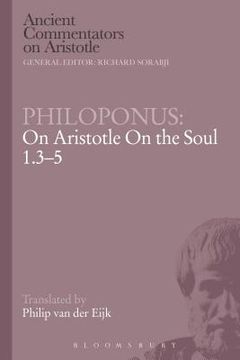Reseña del libro "Philoponus: On Aristotle on the Soul 1.3-5 (en Inglés)"
Until the launch of this series over fifteen years ago, the 15,000 volumes of the ancient Greek commentators on Aristotle, written mainly between 200 and 600 AD, constituted the largest corpus of extant Greek philosophical writings not translated into English or other European languages. This text by Philoponus rejects accounts of soul, or as we would say of mind, which define it as moving, as cognitive, or in physical terms. Chapter 3 considers Aristotle's attack on the idea that the soul is in motion. This was an attack partly on his teacher, Plato, since Plato defines the soul as self-moving. Philoponus agrees with Aristotle's attack on the idea that a thing must be in motion in order to cause motion. But he offers what may be Ammonius' interpretation of Plato's apparently physicalistic account of the soul in the Timaeus as symbolic. What we would call the mind-body relation is the subject of Chapter 4. Plato and Aristotle attacked a physicalistic theory of soul, which suggested it was the blend, ratio, or harmonious proportion of ingredients in the body.Philoponus attacked the theory too, but we learn from him that Epicurus had defended it. In Chapter 5, Philoponus endorses Aristotle's rejection of the idea that the soul is particles and of Empedocles' idea that the soul must be made of all four elements in order to know what is made of the same elements. He also rejects, with Aristotle, definitions of the soul as moving or cognitive as ignoring lower forms of life. He finally discusses Aristotle's rejection of Plato's localisation of parts of the soul in parts of the body, but asks if new knowledge of the brain and the nerves do not require some kind of localisation.

